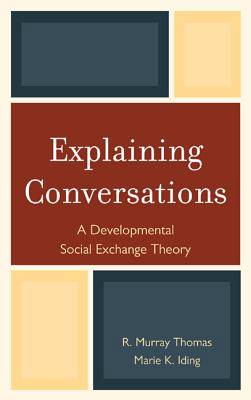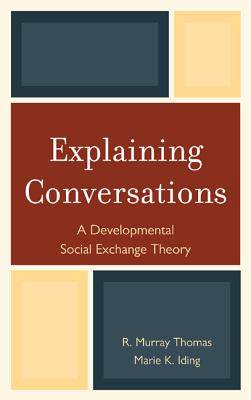
- Afhalen na 1 uur in een winkel met voorraad
- Gratis thuislevering in België vanaf € 30
- Ruim aanbod met 7 miljoen producten
- Afhalen na 1 uur in een winkel met voorraad
- Gratis thuislevering in België vanaf € 30
- Ruim aanbod met 7 miljoen producten
Zoeken
Explaining Conversations
A Developmental Social Exchange Theory
R Murray Thomas, Marie K Iding
Hardcover | Engels
€ 104,95
+ 209 punten
Omschrijving
Explaining Conversations offers a different way of interpreting people's social exchanges than has been available in the past. The book is replete with examples of people's verbal interactions in the form of chats, arguments, debates, and negotiations, both within a culture and across cultures. The volume's subtitle, A Developmental Social-Exchange Theory, identifies a theme featured in Chapters 2 and 5--the typical pattern by which social-exchange skills evolve over the first two decades of life. Throughout the book, the underlying meanings of conversations are interpreted in terms of (a) the needs people seek to fulfill through their conversations, (b) the influence of a person's culture on what is said, (c) individuals' patterns of thought (metacognition) during a conversation, (d) how people's expectations about a conversation affect what they will say, and (e) strategies individuals adopt to achieve their goals. The book includes a chapter designed to guide parents and teachers in promoting young children's and adolescents' social-exchange skills.
Specificaties
Betrokkenen
- Auteur(s):
- Uitgeverij:
Inhoud
- Aantal bladzijden:
- 218
- Taal:
- Engels
Eigenschappen
- Productcode (EAN):
- 9780765708724
- Verschijningsdatum:
- 15/12/2011
- Uitvoering:
- Hardcover
- Formaat:
- Genaaid
- Afmetingen:
- 162 mm x 239 mm
- Gewicht:
- 485 g

Alleen bij Standaard Boekhandel
+ 209 punten op je klantenkaart van Standaard Boekhandel
Beoordelingen
We publiceren alleen reviews die voldoen aan de voorwaarden voor reviews. Bekijk onze voorwaarden voor reviews.











